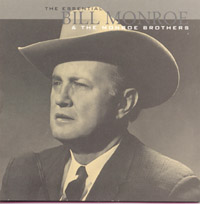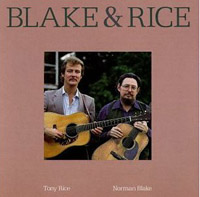New River Train
 |
New River Train is an early country song popular nowadays in both old-time and bluegrass circles. Recordings of it date back at least to the mid 1920's. One early performance is by Kelly Harrell (1889 - 1942), who recorded it for Victor in 1925. It is said that Harrell's recording career was cut short by virtue of the fact that he didn't play an instrument well enough to back himself up. When the Great Depression hit the recording industry, the bean counters didn't want to pay extra for backup musicians, so the singer/instrumentalists got the gigs. Let this be a lesson to you.
Audio Clip: Kelly Harrell sings (but doesn't play) New River Train 1925
Bill Monroe recorded the song before he was Bill Monroe. Well, you know what I mean: before he was The Bill Monroe. In the 1930's—that would be pre-Bluegrass—mandolinist Monroe was playing with his brother Charlie on guitar. In 1936 they had a big hit with a gospel song that asks, What Would You Give In Exchange For Your Soul? They recorded another 60 tracks for Victor's Bluebird label over the next couple of years, including New River Train. Before you complain to me about how fast we play it, trying keeping up with these two.
Audio Clip: The Monroe Bothers on a high-speed New River Train
 |
Our next two clips demonstrate how the song might be played even farther up in the hills, at least if those hills happen to be in southwestern Virginia, home of the Old Fiddler's Convention in Galax. One of the "old fiddlers" most firmly associated with that gathering—Wade Ward (1892-1971, shown left in 1937)—is better known for his clawhammer banjo playing than his fiddling, and our next clip gives you a sampling of just that. Listen closely to the melody he's plucking out amid all the other notes of the arrangement. That's what you might call a "mountain modal" take on the tune. (Just made that up; but it's true.)
Audio Clip: Wade Ward plays New River Train, 1962
The Iron Mountain String Band hails from the same neck of the backwoods as Ward so it's no surprise that their treatment of the tune is similar. Often working from field recordings and direct encounters with old master (like Ward) IMSB is all about playing it legit. Here the song gets the full string-band treatment. So picture this: it's Friday night, the end of a week of hard physical work, and this group is playing at a neighbor's barn. A few minutes ago you were exhausted (and you will be again very soon), but right now, could you not dance to this?
Audio Clip: Iron Mountain String Band riding that New River Train
 |
Folks with little exposure to the sort of true mountain music heard in the examples above might think of Norman Blake and Tony Rice as hillbilly musicians. But back-to-back with the recordings we've just sampled you can clearly hear how far "traditional" country music had come by the time these two master flatpickers sat down in 1987 to make the first of their two duo recordings, one of my all-time favorites. The word "polished" comes to mind. They have very different styles, something you can hear very clearly on this last track. (You'd hear it even better by spending some summer with that CD, your guitar and a digital slow-downer.) The first instrumental solo is pure Blake; the second, vintage Rice.
Audio Clip: Blake and Rice on New River Train
All Community Guitar Resources text & material © 2006 Andrew Lawrence
